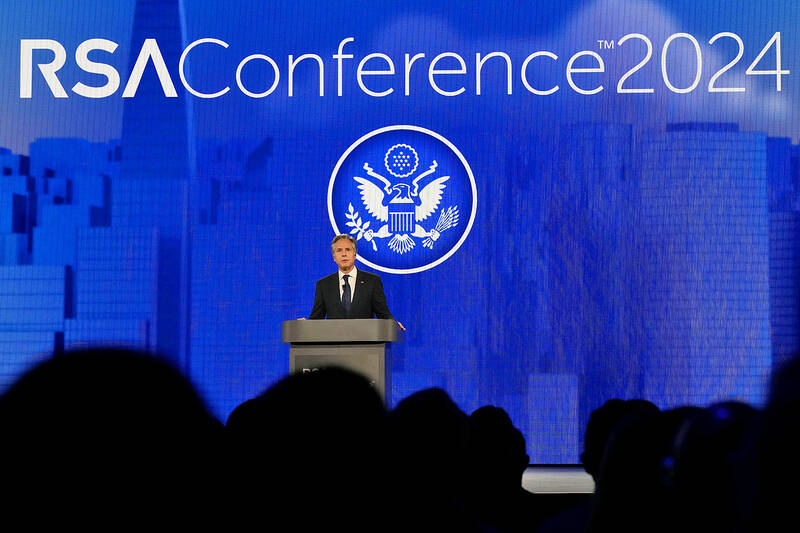Taiwan, the US, Japan, Australia and New Zealand are working together to install undersea cables as a demonstration of digital solidarity, US Secretary of State Antony Blinken said on Monday.
Blinken talked about the cooperation in a speech he delivered at the RSA Conference in San Francisco.
He said that the US International Cyberspace and Digital Strategy launched by the US Department of State “treats digital solidarity as our North Star.”

Photo: AP
“Solidarity informs our approach not only to digital technologies, but to all key foundational technologies,” Blinken said.
Under the strategy, the US is to work with international partners “to shape the design, development, governance, and use of cyberspace and digital technologies,” the US Department of State said on Monday.
As part of the effort, the US has established partnerships with Taiwan, Japan, Australia and New Zealand to install and operate “a cable that will connect up to 100,000 people across the spread-out Pacific Islands,” as well as other similar projects in South America, Africa and the Indo-Pacific region, he said.
If undersea cables are disrupted or compromised, it could lead to isolation, national security risks or huge economic losses as they carry more than 95 percent of the world’s digital traffic across the ocean floor, he added.
Separately, Taiwan has signed four memorandums of understanding (MOU) with three nations under the New Southbound Policy to cooperate on transportation security, science, product assessment and disaster research, the Ministry of Foreign Affairs said yesterday.
Taiwan signed an MOU with Australia on April 2 to expand cooperation on the safety of maritime and railway transportation, Department of East Asian and Pacific Affairs Director Peter Lan (藍夏禮) told a news conference.
Under the MOU, the two sides are to work together on accident investigation, information security and technical training, he said.
Taipei and Canberra on Monday signed another MOU to strengthen cooperation on science and research in fields such as information and communication technology, supply chain resilience, biotechnology and net-zero transformation, Lan said.
On the same day, Taiwan signed an MOU with the Philippines to boost bilateral exchanges and share experiences on landslide and debris flow disasters, he said.
Taiwan last week signed an MOU with Indonesia on cooperation on standardization and conformity assessments, he added.
The MOU would help both sides better understand standards, regulations and certification regarding commodities to lower trade barriers and create a more convenient trade environment for businesses in the two nations, Lan said.

NATIONAL SECURITY THREAT: An official said that Guan Guan’s comments had gone beyond the threshold of free speech, as she advocated for the destruction of the ROC China-born media influencer Guan Guan’s (關關) residency permit has been revoked for repeatedly posting pro-China content that threatens national security, the National Immigration Agency said yesterday. Guan Guan has said many controversial things in her videos posted to Douyin (抖音), including “the red flag will soon be painted all over Taiwan” and “Taiwan is an inseparable part of China,” while expressing hope for expedited “reunification.” The agency received multiple reports alleging that Guan Guan had advocated for armed reunification last year. After investigating, the agency last month issued a notice requiring her to appear and account for her actions. Guan Guan appeared as required,

Japan and the Philippines yesterday signed a defense pact that would allow the tax-free provision of ammunition, fuel, food and other necessities when their forces stage joint training to boost deterrence against China’s growing aggression in the region and to bolster their preparation for natural disasters. Japan has faced increasing political, trade and security tensions with China, which was angered by Japanese Prime Minister Sanae Takaichi’s remark that a Chinese attack on Taiwan would be a survival-threatening situation for Japan, triggering a military response. Japan and the Philippines have also had separate territorial conflicts with Beijing in the East and South China

A strong cold air mass is expected to arrive tonight, bringing a change in weather and a drop in temperature, the Central Weather Administration (CWA) said. The coldest time would be early on Thursday morning, with temperatures in some areas dipping as low as 8°C, it said. Daytime highs yesterday were 22°C to 24°C in northern and eastern Taiwan, and about 25°C to 28°C in the central and southern regions, it said. However, nighttime lows would dip to about 15°C to 16°C in central and northern Taiwan as well as the northeast, and 17°C to 19°C elsewhere, it said. Tropical Storm Nokaen, currently

PAPERS, PLEASE: The gang exploited the high value of the passports, selling them at inflated prices to Chinese buyers, who would treat them as ‘invisibility cloaks’ The Yilan District Court has handed four members of a syndicate prison terms ranging from one year and two months to two years and two months for their involvement in a scheme to purchase Taiwanese passports and resell them abroad at a massive markup. A Chinese human smuggling syndicate purchased Taiwanese passports through local criminal networks, exploiting the passports’ visa-free travel privileges to turn a profit of more than 20 times the original price, the court said. Such criminal organizations enable people to impersonate Taiwanese when entering and exiting Taiwan and other countries, undermining social order and the credibility of the nation’s